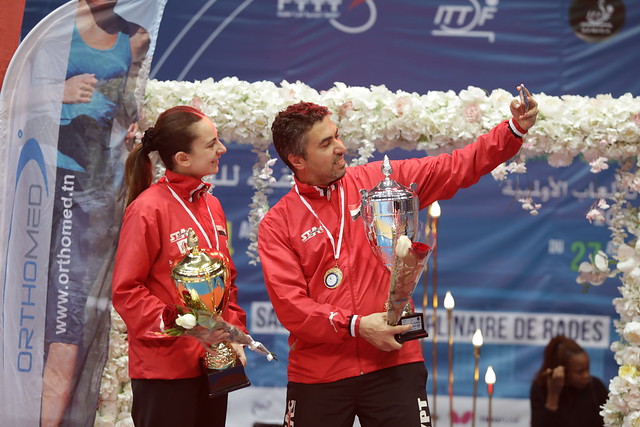by Ian Marshall, Editor
In both finals, Nigeria had to settle for runners up spot.
Ahmed Ali Saleh, the no.2 seed and now 40 years old, caused somewhat of an upset; he accounted for Quadri Aruna, the top seed (11-6, 5-11, 11-9, 6-11, 11-9, 9-11, 11-3) to secure the title.
“I am very happy because I could not imagine that I would beat Aruna in this tournament. All I did was to focus from the first point to the end. I really don’t want to quit at 40 as I want to play until my body cannot do it anymore. I love table tennis and I will continue.” Ahmed Ali Saleh
Somewhat differently for Dina Meshref, 25 year of age, she justified her top seeded position; she accounted for Offiong Edem, the no.2 seed, in the title decider (11-2, 11-8, 8-11, 11-5, 11-6).
“From the start of the competition, I just stayed focused, played my game and did not think about how many times I had won in the past. I must commend Edem because she is an experienced player who played extremely well. She changed tactics time and again which made it sometimes difficult to play against her.” Dina Meshref
Fourth time
Notably for Ahmed Ali Saleh, it is the fourth time that he has won an African Cup title; thus he matches Quadri Aruna and colleague El-Sayed Lashin. Commencing in 1998 El-Sayed Lashin won on four occasions as, with a first win in 2009, did Quadri Aruna.

Furthermore, Ahmed Ali Saleh breaks the stranglehold that Quadri Aruna and Omar Assar, also from Egypt, have held on the title; since 2014 in Lagos, they have shared the honours, three wins each.
Longevity
However, no player can match Ahmed Ali Saleh in terms of longevity; his first win was over 20 years ago in 1997 when, as an aspiring 17 year old, he succeded in Port Elizabeth, later he was to prevail in 2008 in Congo Brazzaville and in 2011 in Rabat.
Incredibly he has won the Africa Cup title once in each of four decades; presumably he must now wait until 2030 for his next win?
Similarly, it means that he will also compete in the Men’s World Cup over a period of four decades. Düsseldorf will be his seventh appearance in the tournament. He made his debut in 1998 in Shantou, later in 2001 he played in Courmayeur; then in 2005 in Liège. More recently he was present in 2007 in Barcelona, 2011 in Paris and 2012 in Liverpool.

Only one other player has competed in the Men’s World Cup in four decades; Belgium’s Jean-Michel Saive made his debut in 1989 in Nairobi, his farewell in 2013 in Liege.
Clear of field
Meanwhile, for Dina Meshref, she is miles clear of the field; in a totally different stratosphere.
She has now won the Africa Cup title eight times. The only other player to have won on more than one occasion is compatriot, Shaimaa Abdul-Aziz, she emerged victorious in 1997 in Port Elizabeth and in 1998 in Cairo.
The first win for Dina Meshref was in 2011 in Rabat; since 2014 in Lagos she has always won.

Furthermore, she now qualifies for eighth ITTF Women’s World Cup appearance; similar to her success in the Africa Cup, she made her debut in 2011 in Singapore and ever since 2014 in Linz, she has been ever present.
Third place in the men’s event was secured by Omar Assar who beat Senegal’s Ibrahima Diaw (11-6, 11-8, 12-10), in the women’s by Cameroon’s Sarah Hanffou, she overcame Egypt’s Yousra Helmy (11-8, 5-11, 11-6, 12-10).


